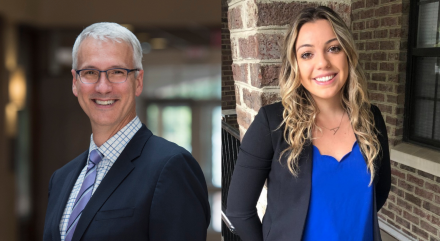The research project not only helped tell the story of SEED Effect’s microfinance program for South Sudanese refugees and Ugandans, it led to the Elon alumna discovering her passion for “doing meaningful data work.”
Steve DeLoach, Martha and Spencer Love Professor of Economics, and Alexa Rasmussen ’21 collaborated on an impact assessment for the nonprofit organization SEED Effect, evaluating the effectiveness of its savings-led microfinance program for South Sudanese refugees and Ugandans.

DeLoach and Rasmussen analyzed data from 2018 to early 2020 to examine whether SEED Effect members experienced higher self-reliance and empowerment in comparison to non-participants in the same communities. They found the microfinance program had significant positive effects for both refugee and host community participants.
SEED Effect shared the findings in its annual report and used them to help secure a large grant from the Excellence in Giving Kingdom Giving Fund to expand its operations in northern Uganda.
DeLoach’s work with SEED Effect began three years ago after he learned about the organization from his Honors mentee Grace O’Hara ’18, who interned with SEED Effect and then joined the organization after graduation.
“For me, this work is a nice merger of my teaching, undergraduate research mentoring and my own research agenda, which has included several papers on the impact of access to savings and credit on the well-being of peoples in developing countries,” DeLoach said. “Alexa is the third student in an ongoing stream of Elon students who have engaged with me to do research on SEED Effect’s program.”
Rasmussen, who now works at NERA Economic Consulting as a research associate, credits this project as the main influence behind her decision to pursue a career in economics consulting. “This project revealed to me my passion for doing meaningful data work,” she said.
“Learning under Dr. DeLoach allowed me to build my critical thinking skills in ways I had never been able to in my actual classes,” she added. “He encouraged me to think about my research from different perspectives, and dig more into the ‘why’ behind data, rather than just the ‘what.’ I walked away from this project confident in my ability to use the skills I had acquired throughout it in infinite ways.
“I was honestly terrified of coding and data work, but through Dr. DeLoach’s mentorship I quickly realized that I was entirely capable of not only doing this work, but loving it and making a career out of it.”


